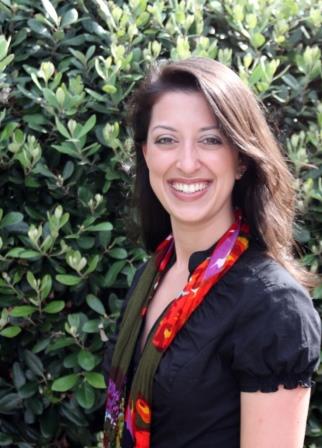By: Dr. Laura K. Guyer
 Sarah Catalanotto, MPH, CTTS was raised in an environment of activism and concern for the welfare of underserved people. Watching her father, UF faculty member Frank Catalanotto, DMD, advocate for all to have access to quality oral health care, Sarah knew that she too wanted to help others. From an early age, she was interested in health and a career in law seemed to be the best way to become an advocate. However, her career path solidified when she discovered public health and found it would best prepare her to promote and protect the health of people and communities.
Sarah Catalanotto, MPH, CTTS was raised in an environment of activism and concern for the welfare of underserved people. Watching her father, UF faculty member Frank Catalanotto, DMD, advocate for all to have access to quality oral health care, Sarah knew that she too wanted to help others. From an early age, she was interested in health and a career in law seemed to be the best way to become an advocate. However, her career path solidified when she discovered public health and found it would best prepare her to promote and protect the health of people and communities.
After completing a Master of Public Health (MPH) degree at UF, Sarah launched her career at the Alachua County Health Department’s Tobacco Free Alachua (TFA) office. Tobacco use is the single leading cause of preventable death and disability in the U.S. and annually accounts for one in five deaths. In 2006, Florida voters supported a constitutional amendment to develop a comprehensive tobacco education and use prevention program. At TFA, Sarah learned to advocate for health improvement using policy, create effective community partnerships, and give back to her profession as a mentor and intern supervisor.
In 2011, she joined Suwannee River Area Health Education Center (AHEC) as the Tobacco Program Manager and was responsible for directing the tobacco cessation and training programs in twelve north Florida counties. AHECs were established nationwide in the early 1970’s to “improve the supply, distribution, retention and quality of primary care and other health practitioners in rural and medically underserved areas.” Sarah grew personally and professionally at Suwannee River AHEC and when the opportunity to transition to Associate Director and Executive Director arose, she embraced it.
Sarah finds purpose and fulfillment when collaborating with safety net clinics, non-profit health organizations, and UF faculty to connect rural residents to medical, dental, and mental health care. Rural communities face unique challenges because they often compete with urban areas to recruit and support primary care professionals. Rural populations are too small to support specialists (e.g., cardiologists, neurologists, orthodontists) and the numbers of primary care providers are often inadequate to meet the health care needs of all county residents.
Rural life has a different dynamic than life in more urban areas where amenities like entertainment and shopping are abundant. Nearly twenty percent of Americans choose to live in rural communities because it is easier to form close-knit relationships with neighbors, business leaders, and health providers. When health care is delivered by professionals who care for different members of the same family, it can be more personal and relevant.
Suwannee River AHEC was among the first seven agencies to partner with the Center for Gender, Sexualities, and Women’s Studies Research to create the service-learning capstone course, Practicum in Health Disparities. The professionals at AHEC treat practicum students like members of their team and provide active mentoring, guidance, and opportunities to apply academic learning to real world problems. One of the first assignments in the practicum is a reflection about the definition and operationalization of the word professionalism. One student wrote:
The first day I was at the site, Sarah informed me that everyone in the office eats lunch together every day with each other. I was taken aback because I am used to work environments where you have [more formal] relationships with people, not casual. It is through this reflection where I realize that there is no absolute definition of professionalism. In my practicum site, it would feel unprofessional if I chose not to eat lunch with those in the office. I have been impacted this week by the kindness and closeness my fellow coworkers have with each other. It is very obvious how much everyone enjoys working with each other and seeing each other daily. I think this makes for a more productive work environment and . . . in the future, I will remember the affirming and encouraging environment at Suwannee River AHEC.
Some Americans live with a disproportionate lack of access to quality health care. The health care safety net provided by rural clinics and supported by organizations like Suwannee River AHEC prevents them from “falling between the cracks” of the health care system. For Sarah, each practicum student represents the future and just as she was influenced by her father’s example, she mentors and inspires the next generation of leaders and health professionals so they will be ready to receive the baton she is passing.